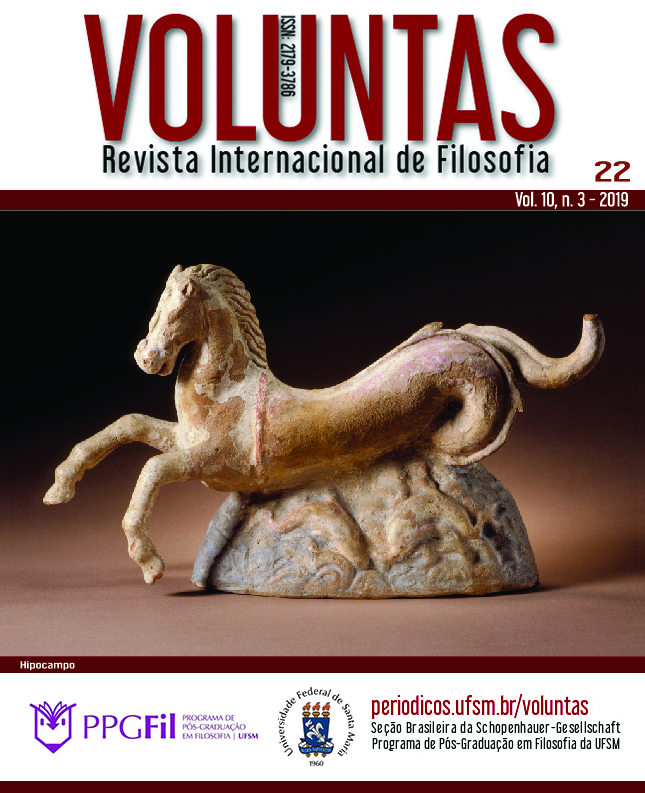Aesthetic complacency and satisfaction of will in Schopenhauer's metaphysic of the beauty
DOI:
https://doi.org/10.5902/2179378639300Parole chiave:
Schopenhauer, Kant, Disinterest, ComplacencyAbstract
Following in the footsteps of Kant, Schopenhauer builds his Metaphysics of the beauty from the conception of art “disinterested”. Knowledge determined by motives gives to the spectator of art the “exciting” and the mere empirical satisfaction, but not the beauty or the sublime. The Genius, most potent and effective representation of the Pure Subjectivity of Knowledge is described in the Book III of The world as will and representation in an apparently ambiguous way: as the Willenlos (free of will), like that free of the storm of the passions and the impetus of desires. But at the same time as that subjected to vehement affections and irrational passions. However, it is, in the aesthetic experience of the genius or the contemplator of art, a disinterested pleasure, a complacency of another order than that of the man of common sense and science. The article then seeks to analyze Schopenhauer’s concept of aesthetic complacency or satisfaction and its roots in Kant’s philosophy.Downloads
Riferimenti bibliografici
CACCIOLA, Maria Lúcia. O conceito de interesse. Cadernos de Filosofia Alemã, São Paulo, Vol. 5, 1999, pp. 5-15.
KANT, Immanuel. Crítica da faculdade do juízo. Trad. Valério Rohden e António Marques. Rio de Janeiro: Forense Universitária, 1995.
KANT, Immanuel. Fundamentação da metafísica dos costumes. Trad. Paulo Quintela. São Paulo: Abril Cultural, 1980 (Col. Os Pensadores).
MORAES, Dax. Desinteresse e comprazimento estético: considerações acerca da apreciação da estética kantiana por Schopenhauer face às de Hegel e Heidegger. O que nos faz pensar, Rio de Janeiro, Vol. 28, 2010, p. 145-167.
SCHOPENHAUER, Arthur. Sämtliche Werke. Textkritisch bearbeitet und herausgegeben von Wolfgang Frhr. Löhneysen. Darmstadt: Wissenschaftliche Buchgesellschaft, 1968.
SCHOPENHAUER, Arthur. O mundo como vontade e como representação (W I). Trad. Jair Barboza. São Paulo: Editora da Unesp, 2005.
SCHOPENHAUER, Arthur. O mundo como vontade e representação. Livro III. Trad. Maria Lúcia Mello e Oliveira Cacciola. São Paulo: Abril Cultural, 1980 (Col. Os Pensadores).
SCHOPENHAUER, Arthur. Sobre o fundamento da moral. 2ª ed. Trad. Maria Lúcia Mello e Oliveira Cacciola. São Paulo: Martins Fontes, 2001.
##submission.downloads##
Pubblicato
Come citare
Fascicolo
Sezione
Licenza
La presentazione degli originali a questa rivista implica il trasferimento, da parte degli autori, dei diritti di pubblicazione stampate e digitali alla stessa, fatta eccezione dei diritti d'autore, che per gli articoli pubblicati rimangano all’autore, con diritti periodici sulla prima pubblicazione. Gli autori possono utilizzare gli stessi risultati solo in altre pubblicazioni che indicano chiaramente questa rivista come pubblicazione originale. Poiché siamo una rivista ad accesso aperto, consentiamo l'uso gratuito di articoli in applicazioni educative, scientifiche e non commerciali, a condizione che venga menzionata esplicitamente la fonte.






